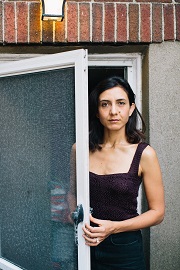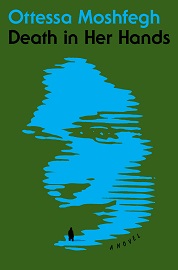- Categories:
A Q&A With Ottessa Moshfegh, Author of #1 Indie Next List Pick Death in Her Hands
- By Emily Behnke
Independent booksellers across the country chose Death in Her Hands by Ottessa Moshfegh (Penguin Press) as their number-one pick for the May 2020 Indie Next List, though the publication date for the book was postponed due to the COVID-19 outbreak.
“Ottessa Moshfegh is a modern-day Camus,” said Chris Lee of Boswell Book Company in Milwaukee, Wisconsin. “A woman finds a note in the woods that proclaims someone is dead. Murdered, in fact. She investigates between dog walks and early evening naps, but soon facts, memories, and suppositions entwine and overlap until the simple act of asking a question can unravel the thread of an entire life. Ponderous, violent, forgetful, and deft, Death in Her Hands is a genre-bender that teases you into asking, Is this noir? Horror? A whacked-out farce? Or a sly literary trick? I’ll tell you what it is — absolutely brilliant.”
Moshfegh’s novella McGlue won the Fence Modern Prize in Prose and the Believer Book Award. She is also the author of the short story collection Homesick for Another World. Her stories have been published in The Paris Review, The New Yorker, and Granta, and have earned her a Pushcart Prize, an O. Henry Award, the Plimpton Discovery Prize, and a grant from the National Endowment for the Arts. Eileen, her first novel, was shortlisted for the National Book Critics Circle Award and the Man Booker Prize, and won the PEN/Hemingway Award for debut fiction; My Year of Rest and Relaxation, her second novel, was a New York Times bestseller and the #1 Indie Next List Pick for July 2018.
Here, Bookselling This Week and Moshfegh discuss crafting a murder mystery.
Bookselling This Week: Where did the idea for Death in Her Hands come from?
Ottessa Moshfegh: Most of the time, my books are born out of an instinct or desire to capture a feeling. In this case, a note (which the main character finds at the start of the novel) came to me full form like a message from another world. I wrote it down, and the novel that proceeds it is simply an imaginative response to that note.
BTW: The book follows Vesta Gul, a 72-year-old widow whose only companion is her dog, Charlie. How did you craft her character?
OM: I crafted Vesta through writing in her voice and letting her motivations and thoughts control the movement of the story. The way I do this as a writer is I place myself right next to Vesta in my imagination, I imagine her and watch her and try to read her mind. In the world of the novel, I am like a nosy ghost following her around.
BTW: Vesta finds herself wrapped up in a murder mystery. What drew you to this genre?
OM: I have always been fascinated by murders in small towns. Since childhood, I have loved true crime — Unsolved Mysteries, America’s Most Wanted, etc. Now there are countless documentary series about killers in rural America, among other killers. I think mystery in general is a genre most comparable to a spiritual exercise: It’s the search for truth.
BTW: Agatha Christie is mentioned a few times over the course of the book. Did you find yourself influenced by her work at all while writing?
OM: Weirdly, I have never read an Agatha Christie novel! But I grew up watching Monsieur Poirot with my sister, and that certainly influenced how I imagined Vesta would think of mysteries.
BTW: At one point in the book, Vesta downloads a character sheet marketed toward writers and begins to fill it out in order to better understand the mystery she’s found herself in. Why did you decide to incorporate this aspect of the book?
OM: I wanted to explore how Vesta, who is not a writer, might go about solving a mystery. And I wanted to draw a connection between sleuthing and novel-writing. I also needed to help Vesta organize her thoughts in a way that would propel a narrative of her own design.
BTW: Can you describe your writing process? Are character sheets, or any other kind of templates, part of it?
OM: For this book, I did not plan or sketch or pre-think anything. I simply sat down every day and wrote, without looking back at any of the previous day’s writing. I wanted the writing to feel spontaneous and present, like Vesta’s own thoughts.
BTW: During her research, Vesta also notes that “mystery was an artless genre.” Having written stories with elements of mystery, have you found yourself thinking about this?
OM: I wasn’t really thinking about that. I was more letting Vesta reflect upon genre as it was represented online.
BTW: Can you describe what artful writing means to you? Is there value in thinking about writing in these terms?
OM: Artful writing is like music. To me it is valuable, because I want my work to resonate in the reader beyond the mundane meaning of the words.
BTW: In crafting her mystery, Vesta names her victim Magda and her perpetrator Ghod. Both of these names have religious connotations — what made you choose them?
OM: Vesta listens to Christian radio, thinks about the metaphysical nature of things. Ghod, which sounds like “God,” was created by a slip of the pen when Vesta tries to write the word “Ghoul.”
BTW: The poetry of William Blake is another important aspect of this book. Why Blake?
OM: It’s not a very meaningful aspect of the book, honestly. When Vesta thinks a boy called Blake might be the writer of the note, the name sticks in her head. She just so happens to find a book of poetry by William Blake. She considers it some kind of clue or signpost.
BTW: Can you tell readers what you’re working on next?
OM: During the quarantine, I began writing a novel set in a fictional village in Eastern Europe in the late Middle Ages.

